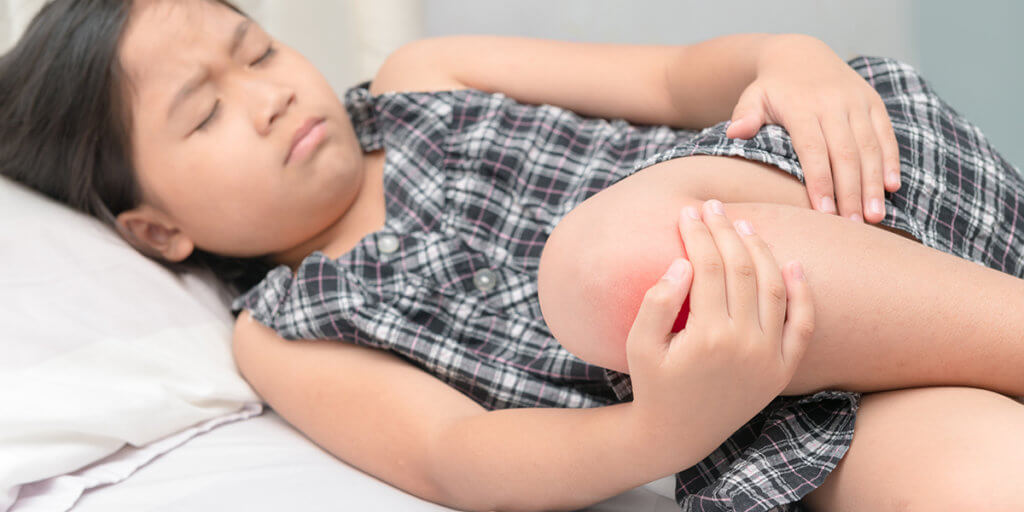
July is recognized as Juvenile Arthritis Awareness Month. We know what you’re thinking, “juvenile arthritis? Kids don’t get arthritis…”. That is actually a myth! In fact, 1 in every 1,000 children develops some type of chronic arthritis. This common misconception is why July is dedicated to making everyone aware that kids get arthritis too! Juvenile arthritis (JA), also known as pediatrics rheumatic disease, isn’t exactly a disease in itself, it is an umbrella term that is used to describe the several autoimmune and inflammatory conditions that can develop in children aged 16 and under, though rarely in the first six months of life. Juvenile arthritis affects nearly 300,00 children in the US!
Believe it or not, there are seven types of Juvenile arthritis, and though they share a few common symptoms, like pain, joint swelling, and redness, they are each distinct and have their own specific concerns and symptoms. Some types of JA can affect children’s musculoskeletal system, which provides support, stability, and movement to the body, but the joint symptoms may only be minor or even nonexistant. JA can also affect the eyes, skin, muscles, and gastrointestinal tract.
The seven types of Juvenile Arthritis:
- Juvenile idiopathic arthritis (JIA) – this type of JA is considered the most common form of arthritis.
- Juvenile dermatomyositis – this inflammatory disease causes muscle weakness and a skin rash on the eyelids and knuckles.
- Juvenile lupus – this type of JA is also an inflammatory disease. The most common form is systemic lupus erythematosus, or SLE. This disease affects the joints, skin, kidneys, blood, and other areas of the body.
- Juvenile scleroderma – scleroderma literally means “hard skin” and is a group of conditions that causes the skin to tighten and harden.
- Kawasaki disease – this disease can lead to heart complications from causing blood-vessel inflammation.
- Mixed connective tissue disease – this particular type of JA may include other features of arthritis, lupus dermatomyositis, and scleroderma.
- Fibromyalgia – This is a chronic pain syndrome that can cause stiffness and aches, along with fatigue, disrupted sleep, and more. This disease is actually more common in girls and is rarely diagnosed before puberty.
Unfortunately, there is no known cause for most forms of JA. There is also little to no evidence that suggests diet or allergies can lead to JA in children. Some research points to a genetic predisposition. What we do know is that it can be diagnosed and treated. However, the diagnostic process can be long and detailed – the key is a careful physical exam with a thorough medical history. It can be a little challenging to diagnose your child because some kids may not complain of pain at first, and joint swelling is not always obvious. Community Care Rheumatology is able to see children ages 16 and older. If you think your child may be suffering from JA, speak with your primary care practitioner or call our office at 518-782-3899 to schedule an appointment. Our rheumatologists can perform a thorough exam for your child to diagnose their symptoms. They can also work with you to develop a treatment plan, if necessary.
When it comes to treating JA, it is similarly complex. Since there is no cure, the overall goal is to relieve inflammation, control pain, and improve your child’s overall quality of life. Most treatment plans incorporate a combination of medication, physical activity, eye care, and healthy eating. Self-care is crucial when it comes to treating JA. It involves helping your child address the emotional and social effects of the disease, and how the choices we make every day can influence our overall health.
Children who grow up with Juvenile arthritis face many challenges. However, with proper care, most children can live fulfilling and active lives – often being able to do the same things as their peers. The key is the diagnosis, treatment, and self-care. Speak with your primary healthcare provider if you have questions or concerns regarding your child. We also have a Concierge Care Coordinator who would be happy to answer your questions and direct you to the appropriate line of care. To speak with her, please call 518-782-3800.
Resources:
https://www.arthritis.org/about-arthritis/types/juvenile-arthritis/
https://www.rheumatology.org/I-Am-A/Patient-Caregiver/Diseases-Conditions/Juvenile-Arthritis
